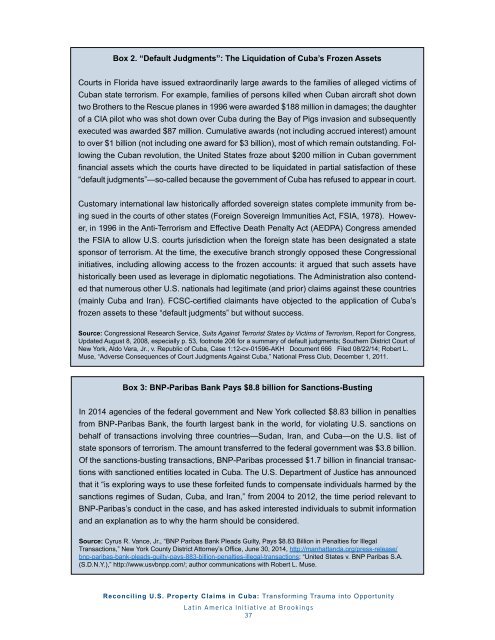Reconciling U.S Property Claims in Cuba
reconciling-us-property-claims-in-cuba-feinberg
reconciling-us-property-claims-in-cuba-feinberg
Create successful ePaper yourself
Turn your PDF publications into a flip-book with our unique Google optimized e-Paper software.
Box 2. “Default Judgments”: The Liquidation of <strong>Cuba</strong>’s Frozen Assets<br />
Courts <strong>in</strong> Florida have issued extraord<strong>in</strong>arily large awards to the families of alleged victims of<br />
<strong>Cuba</strong>n state terrorism. For example, families of persons killed when <strong>Cuba</strong>n aircraft shot down<br />
two Brothers to the Rescue planes <strong>in</strong> 1996 were awarded $188 million <strong>in</strong> damages; the daughter<br />
of a CIA pilot who was shot down over <strong>Cuba</strong> dur<strong>in</strong>g the Bay of Pigs <strong>in</strong>vasion and subsequently<br />
executed was awarded $87 million. Cumulative awards (not <strong>in</strong>clud<strong>in</strong>g accrued <strong>in</strong>terest) amount<br />
to over $1 billion (not <strong>in</strong>clud<strong>in</strong>g one award for $3 billion), most of which rema<strong>in</strong> outstand<strong>in</strong>g. Follow<strong>in</strong>g<br />
the <strong>Cuba</strong>n revolution, the United States froze about $200 million <strong>in</strong> <strong>Cuba</strong>n government<br />
f<strong>in</strong>ancial assets which the courts have directed to be liquidated <strong>in</strong> partial satisfaction of these<br />
“default judgments”—so-called because the government of <strong>Cuba</strong> has refused to appear <strong>in</strong> court.<br />
Customary <strong>in</strong>ternational law historically afforded sovereign states complete immunity from be<strong>in</strong>g<br />
sued <strong>in</strong> the courts of other states (Foreign Sovereign Immunities Act, FSIA, 1978). However,<br />
<strong>in</strong> 1996 <strong>in</strong> the Anti-Terrorism and Effective Death Penalty Act (AEDPA) Congress amended<br />
the FSIA to allow U.S. courts jurisdiction when the foreign state has been designated a state<br />
sponsor of terrorism. At the time, the executive branch strongly opposed these Congressional<br />
<strong>in</strong>itiatives, <strong>in</strong>clud<strong>in</strong>g allow<strong>in</strong>g access to the frozen accounts: it argued that such assets have<br />
historically been used as leverage <strong>in</strong> diplomatic negotiations. The Adm<strong>in</strong>istration also contended<br />
that numerous other U.S. nationals had legitimate (and prior) claims aga<strong>in</strong>st these countries<br />
(ma<strong>in</strong>ly <strong>Cuba</strong> and Iran). FCSC-certified claimants have objected to the application of <strong>Cuba</strong>’s<br />
frozen assets to these “default judgments” but without success.<br />
Source: Congressional Research Service, Suits Aga<strong>in</strong>st Terrorist States by Victims of Terrorism, Report for Congress,<br />
Updated August 8, 2008, especially p. 53, footnote 206 for a summary of default judgments; Southern District Court of<br />
New York, Aldo Vera, Jr., v. Republic of <strong>Cuba</strong>, Case 1:12-cv-01596-AKH Document 666 Filed 08/22/14; Robert L.<br />
Muse, “Adverse Consequences of Court Judgments Aga<strong>in</strong>st <strong>Cuba</strong>,” National Press Club, December 1, 2011.<br />
Box 3: BNP-Paribas Bank Pays $8.8 billion for Sanctions-Bust<strong>in</strong>g<br />
In 2014 agencies of the federal government and New York collected $8.83 billion <strong>in</strong> penalties<br />
from BNP-Paribas Bank, the fourth largest bank <strong>in</strong> the world, for violat<strong>in</strong>g U.S. sanctions on<br />
behalf of transactions <strong>in</strong>volv<strong>in</strong>g three countries—Sudan, Iran, and <strong>Cuba</strong>—on the U.S. list of<br />
state sponsors of terrorism. The amount transferred to the federal government was $3.8 billion.<br />
Of the sanctions-bust<strong>in</strong>g transactions, BNP-Paribas processed $1.7 billion <strong>in</strong> f<strong>in</strong>ancial transactions<br />
with sanctioned entities located <strong>in</strong> <strong>Cuba</strong>. The U.S. Department of Justice has announced<br />
that it “is explor<strong>in</strong>g ways to use these forfeited funds to compensate <strong>in</strong>dividuals harmed by the<br />
sanctions regimes of Sudan, <strong>Cuba</strong>, and Iran,” from 2004 to 2012, the time period relevant to<br />
BNP-Paribas’s conduct <strong>in</strong> the case, and has asked <strong>in</strong>terested <strong>in</strong>dividuals to submit <strong>in</strong>formation<br />
and an explanation as to why the harm should be considered.<br />
Source: Cyrus R. Vance, Jr., “BNP Paribas Bank Pleads Guilty, Pays $8.83 Billion <strong>in</strong> Penalties for Illegal<br />
Transactions,” New York County District Attorney’s Office, June 30, 2014, http://manhattanda.org/press-release/<br />
bnp-paribas-bank-pleads-guilty-pays-883-billion-penalties-illegal-transactions; “United States v. BNP Paribas S.A.<br />
(S.D.N.Y.),” http://www.usvbnpp.com/; author communications with Robert L. Muse.<br />
<strong>Reconcil<strong>in</strong>g</strong> U.S. <strong>Property</strong> <strong>Claims</strong> <strong>in</strong> <strong>Cuba</strong>: Transform<strong>in</strong>g Trauma <strong>in</strong>to Opportunity<br />
Lat<strong>in</strong> America Initiative at Brook<strong>in</strong>gs<br />
37


